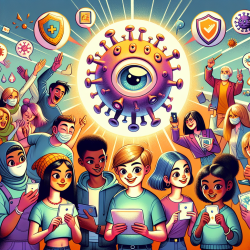Introduction
The COVID-19 pandemic has had profound impacts on various aspects of life, with educational institutions being no exception. A study titled "Social Distancing among Medical Students during the 2019 Coronavirus Disease Pandemic in China: Disease Awareness, Anxiety Disorder, Depression, and Behavioral Activities" offers valuable insights into the mental health and behavioral adaptations of medical students during this period. This blog explores how practitioners can leverage these findings to enhance their skills and outcomes in online therapy services.
Understanding the Study
The study conducted a nationwide survey of medical students in China, focusing on their awareness of COVID-19, mental health status, and behavioral changes during the pandemic. Key findings revealed that despite high awareness levels, medical students experienced significant anxiety and depression, particularly those in Wuhan, the epicenter of the outbreak. Factors contributing to mental health challenges included negative thoughts, gender, and lifestyle changes.
Key Takeaways for Practitioners
Practitioners can derive several actionable insights from this study:
- Psychological Support is Crucial: The study highlights the need for psychological support even among well-informed individuals. Practitioners should prioritize mental health support in their therapy sessions, especially during crises.
- Tailored Interventions: Understanding that different demographics (e.g., gender, location) may experience varying levels of anxiety and depression can help practitioners tailor their interventions more effectively.
- Encourage Healthy Lifestyles: Promoting healthy lifestyle choices can mitigate depression and anxiety. Practitioners should incorporate lifestyle counseling into their therapy sessions.
Encouraging Further Research
While the study provides significant insights, it also opens avenues for further research. Practitioners are encouraged to explore:
- Longitudinal Studies: Investigating long-term mental health impacts of social distancing on students.
- Cross-Cultural Comparisons: Understanding how different cultural contexts influence mental health outcomes during pandemics.
- Technology in Therapy: Exploring the role of technology in providing effective psychological support remotely.
Conclusion
The findings from this study underscore the importance of addressing mental health needs during unprecedented times like the COVID-19 pandemic. By integrating these insights into their practice, practitioners can enhance the effectiveness of their online therapy services and contribute to better outcomes for their clients.
To read the original research paper, please follow this link: Social Distancing among Medical Students during the 2019 Coronavirus Disease Pandemic in China: Disease Awareness, Anxiety Disorder, Depression, and Behavioral Activities.










